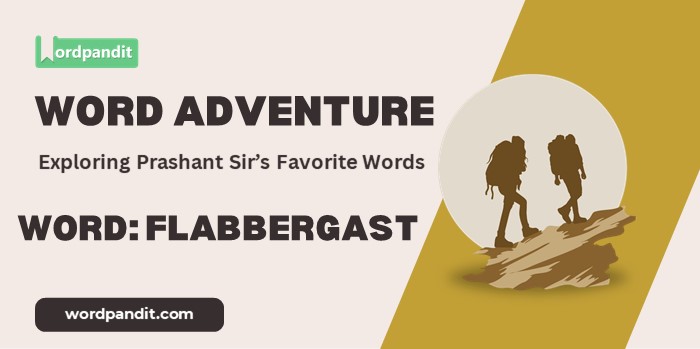Word Adventure: Flabbergast
The Headline
"Flabbergast: When Surprise Leaves You Speechless"
The Scoop
In the grand theater of the English language, some words make a dramatic entrance that leaves the audience stunned. 'Flabbergast' is one such showstopper – a term that not only describes a state of astonishment but seems to embody it in its very sound. Let's peel back the curtain on this wonderfully expressive word and discover why it continues to captivate and, well, flabbergast us!
Let's Break It Down
The Plot Thickens
'Flabbergast' burst onto the linguistic scene in the late 18th century, making its first recorded appearance in 1772. Its origins are as colorful as its meaning – most linguists believe it's a combination of 'flabby' or 'flap' (suggesting a sense of hanging loosely) and 'aghast' (meaning filled with horror or amazement).
What's particularly interesting about 'flabbergast' is how its sound mimics its meaning. The word starts with a sudden burst (flab!) and ends with a gasp (gast!), mirroring the experience of being utterly astonished. This phonetic quality, known as onomatopoeia, contributes to the word's enduring popularity and expressiveness.
Despite its relatively recent entry into the English language, 'flabbergast' has become a beloved part of our lexicon, used in everything from casual conversation to literary works to express a state of complete surprise or disbelief.
Word in the Wild
The Twist
Here's a flabbergasting fact about 'flabbergast': despite its dramatic flair, the word has a surprisingly practical origin. Some etymologists suggest it might have roots in regional dialects, possibly derived from a Suffolk word 'flabbergasted' meaning 'blistered'. This theory proposes that the physical sensation of a blister forming (sudden, surprising, and somewhat uncomfortable) mirrors the emotional experience of being flabbergasted. It's a reminder that even our most expressive words can have surprisingly mundane origins!
Make It Stick
Flabbergast: When surprise hits you like a verbal thunderclap!
Your Turn
Think about a time when you were truly flabbergasted. What caused this state of utter astonishment? How did you react? Share your flabbergasting experiences in the comments below. Let's explore the moments that leave us speechless and the events that can still surprise us in this seen-it-all age!
Down the Rabbit Hole
- Curious about other words that sound like what they mean? Look into onomatopoeias like 'buzz', 'splash', or 'murmur'.
- Interested in the psychology of surprise? Explore studies on the startle response or the role of unexpected events in memory formation.
- Want to dive into the world of linguistic blends? Research other portmanteau words like 'smog', 'brunch', or 'hangry'.
The Last Word
As we conclude our astounding exploration of 'flabbergast', I hope you've gained a new appreciation for this word that so vividly captures our moments of utter surprise. It reminds us of the power of language to not just describe, but to evoke experiences. The next time you find yourself slack-jawed in amazement, remember – you're not just surprised, you're flabbergasted! Until our next word adventure, this is Prashant from Wordpandit, encouraging you to keep seeking out those flabbergasting moments that add wonder and excitement to our lives!












